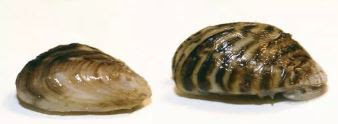Zebra Mussel infestations in nearby New Brunswick and Quebec are a threat to our Maine waterways!

Invasive Zebra mussels have been found within the Saint John River drainage in both Quebec and New Brunswick, with the nearest visual confirmations less than 30 miles away from the Maine/Canada border and even closer potential infestations in the Madawaska River.This places the Saint John River at high risk for infestation and as a potential source for transport on watercraft of zebra mussels into other Maine water bodies. Zebra mussels have not yet been confirmed in any water of the state of Maine but represent a high threat level to the health of our waters, fish, and wildlife. Zebra mussel infestations result in irreversible negative impacts on native species and water body systems and are nearly impossible to eradicate once introduced.Zebra mussels filter and hold a substantial amount of important food and nutrients that native organisms require, negatively impacting all native fish and wildlife in the water body. In addition to significantly impacting our wildlife, and unlike our native mussels, zebra mussels attach to hard surfaces in the water, including watercraft, pipes (which can clog intake/outflow), rocks, docks, and even native mussels. Zebra mussel larvae are microscopic, making it imperative all outdoor enthusiasts use extreme caution to limit the spread.Help limit the spread of zebra mussels! Always practice standard clean, drain, dry recommendations and laws for watercraft. Allowing watercraft and all gear to dry thoroughly between water bodies is one of the most effective ways to prevent the spread of these microscopic zebra mussel larvae.This drying should occur for multiple days (2-5 days) when possible.